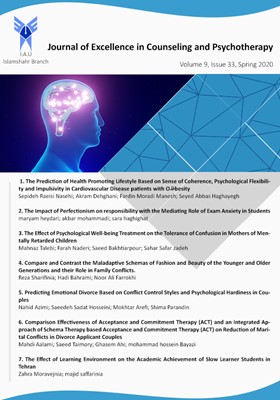Comparison Effectiveness of Acceptance and Commitment Therapy (ACT) and an Integrated Approach of Schema Therapy based Acceptance and Commitment Therapy (ACT) on Reduction of Marital Conflicts in Divorce Applicant Couples
Subject Areas : Journal of Excellence in Counseling and PsychotherapyMahdi Aalami 1 , Saeed Taimory 2 * , Ghasem Ahi 3 , mohammad hossein Bayazi 4
1 - Ph.D student in psychology, Department of Clinical Psycholog, Torbatjam Branch, Islamic Azad University, Torbatjam, Iran
2 - Associate prof, Dept of Clinical Psychology; Torbatjam Branch, Islamic Azad University, Torbatjam, Iran
3 - Associate prof, Dept of Clinical Psychology; Birjand Branch, Islamic Azad University, Birjand, Iran
4 - Associate prof, Dept of Clinical Psychology; Torbatjam Branch, Islamic Azad University, Torbatjam, Iran
Keywords: marital conflicts, acceptance and commitment therapy, Schema Therapy based Acceptance and Commitment Therapy,
Abstract :
Purpose: The aim of this study was to determine comparison effectiveness of Acceptance and Commitment Therapy (ACT) and an integrated approach of Schema Therapy based Acceptance and Commitment Therapy (ACT) on reduction of marital conflicts in Divorce Applicant Couples. Methodology: The present research method was quasi-experimental with pretest-posttest design and control group. The statistical population consisted of 90 couples referring to the Mashhad Crisis Intervention Center in the winter of 2018, which were selected by voluntary sampling method and randomly applied in three experimental and control groups. The experimental groups were trained with a treatment-based approach based on acceptance and commitment and a combined protocol protocol based on acceptance and commitment. All three groups completed the marital conflict scale (MCQ) Sanaei et al. (2008) in the pre-test and post-test stages. Data analysis was performed using SPSS software version 24 and using covariance analysis test at a significance level of 0.05. Results: The findings showed that both treatments were effective in reducing marital conflict and that the F value obtained for both experimental groups at the alpha level was significant at 0.01. There was also a significant difference between the effectiveness of the two treatments. The mean of marital conflicts in ACT group was 2/184 and after treatment 153.4 and the mean of marital conflicts before treatment in the schema group, treatment based on ACT 179/6 and after treatment, 132/1 was obtained. Comparison of averages indicated a greater effectiveness of acceptance-based schema therapy and commitment to reducing marital conflict (P <0.001). Conclusions: Since the divorce rate is increasing in our country, this therapeutic integrated approach can help couples to reduction of marital conflicts and divorce tendency.
_||_

